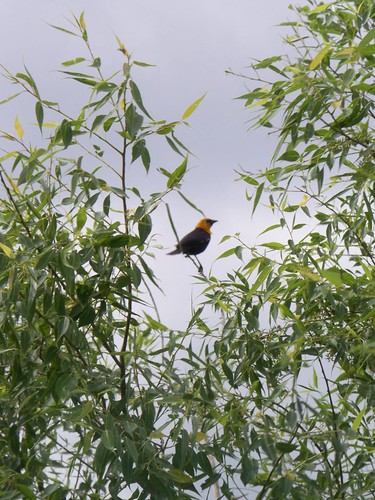Family Wildlife
June 14th, 2007
Greetings from Volga, South Dakota (The Town with a Future!), where I’m hard at work pissing off the local wildlife, along with my dad and my brother (they haven’t really been pissing off the wildlife – just me and my camera). This guy gave me an earful for intruding on his territory (he’s the one that sounds like “the grating of a rusty hinge,” not the nice twittering by his friends in the background (not pictured)). He ought to have conceded me at least a little courtesy though, because he’s living on the Houtman-DeBates Family Wildlife Area, thanks to my Aunt Greta and her husband Larry “Uncle Bates” DeBates, who bought my grandparents’ farm when they retired and eventually arranged a perpetual conservation easement for the property to revert to natural prairie and marsh.
I don’t know as much about conservation easements as I feel I should, and I think they vary somewhat from state to state, but it’s an interesting strategy to restore and preserve natural habitats. Owners who opt for an easement get tax incentives and retain title, control of access, and “compatible use” rights – hunting, fishing, trapping, etc. I have another uncle on my mother’s side who has a similar arrangement in Wisconsin, where he keeps bees and taps maple sap, among other things. They also get assistance restoring the property back to its natural state – burning off weeds, reintroducing native flora (hopefully fauna, like my angry friend above, follow too), restoring water exchange, or whatever else might be called for. And any new development or “non-compatible” use is prohibited for the life of the easement even if the title changes hands.
Louisiana’s DNR has a conservation easement program: the Louisiana Coastal Wetland Reserve Program. It’s a drop in the bucket of all the restoration Louisiana needs, I suppose, but every drop counts.
Now, off with the family to check out the Brookings, SD nightlife, which I suspect is not very wild…


April 28th, 2009 at 9:45 am
I think it is cool that projects like these can be done and there are some tax benefits involved. The reward for preserving areas like this should be rewarded in a time when some developers just seem to blow and go to make a buck.